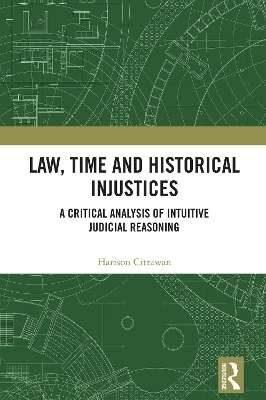
Law, Time and Historical Injustices
A Critical Analysis of Intuitive Judicial Reasoning
Seiten
2024
Routledge (Verlag)
978-1-032-85559-2 (ISBN)
Routledge (Verlag)
978-1-032-85559-2 (ISBN)
- Lieferbar (Termin unbekannt)
- Versandkostenfrei
- Auch auf Rechnung
- Artikel merken
This book provides a critical assessment of how judges reason in the adjudication of historical injustices.
The practice of adjudication in historical cases of injustice require that, in determining collective responsibility, judges impart meaning to past injuries. This book analyses the narrative mechanisms through which this meaning is produced. Focusing on three areas of adjudication–racial discrimination, post-colonial extractivism and the climate crisis–the book’s analysis focuses on the issue of time. It considers the interplay of how historical injustice adjudication is shaped by temporal presuppositions and how it enacts a particular idea of temporality. As experiences of injustice are narrated, the book demonstrates how some of those experiences are included and others are excluded within the process of adjudication. Drawing on legal theory, legal epistemology and the philosophy of time, the book thus offers an instructive, and provocative, account of how collective responsibility is determined in cases of historical injustice.
This book will appeal to scholars working in the fields of legal theory, legal reasoning, socio-legal studies, comparative jurisprudence and transitional justice.
The practice of adjudication in historical cases of injustice require that, in determining collective responsibility, judges impart meaning to past injuries. This book analyses the narrative mechanisms through which this meaning is produced. Focusing on three areas of adjudication–racial discrimination, post-colonial extractivism and the climate crisis–the book’s analysis focuses on the issue of time. It considers the interplay of how historical injustice adjudication is shaped by temporal presuppositions and how it enacts a particular idea of temporality. As experiences of injustice are narrated, the book demonstrates how some of those experiences are included and others are excluded within the process of adjudication. Drawing on legal theory, legal epistemology and the philosophy of time, the book thus offers an instructive, and provocative, account of how collective responsibility is determined in cases of historical injustice.
This book will appeal to scholars working in the fields of legal theory, legal reasoning, socio-legal studies, comparative jurisprudence and transitional justice.
Harison Citrawan is a researcher at the Research Center for Law under the Indonesian National Research and Innovation Agency.
Part I Transition, Trauma and Uncertainty 1. Transitory racial discrimination 2. Traumatic post-colonial extractivism 3. Uncertain climate crisis Part II An Epistemology of Historical Injustice Adjudication 4. Legal reasoning as a creative process 5. Historical injustice as temporal legal inquiry 6. Judicial intuition in time 7. Collective responsibility and law’s time-mindfulness
| Erscheinungsdatum | 14.11.2024 |
|---|---|
| Zusatzinfo | 2 Tables, black and white |
| Verlagsort | London |
| Sprache | englisch |
| Maße | 156 x 234 mm |
| Themenwelt | Geschichte ► Teilgebiete der Geschichte ► Militärgeschichte |
| Recht / Steuern ► Allgemeines / Lexika | |
| Recht / Steuern ► EU / Internationales Recht | |
| Recht / Steuern ► Rechtsgeschichte | |
| Recht / Steuern ► Strafrecht | |
| ISBN-10 | 1-032-85559-2 / 1032855592 |
| ISBN-13 | 978-1-032-85559-2 / 9781032855592 |
| Zustand | Neuware |
| Haben Sie eine Frage zum Produkt? |
Mehr entdecken
aus dem Bereich
aus dem Bereich
neueste Manipulationstechniken als Waffengattung der NATO
Buch | Softcover (2023)
Westend (Verlag)
CHF 33,55


